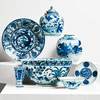A pair of hardwood armchairs, Qing dynasty (1644-1912).
Height of back 92 cm, height of seat 49 cm. Width 58 cm. Depth 42 cm.
Restored.
Alkuperä - Provenienssi
The Stenbeck Collection part II.
The Stenbeck Collection Part II. The collection as a whole comprises a wide range of Chinese porcelain produced during the late Ming and early Qing dynasty for the domestic, Japanese and European markets. The collection concentrates on porcelain produced during the interregnum years between the two dynasties. But as an academic collector you can clearly see how he during the years has spanned it further ahead and dived backwards to fulfill the collection.
Mr Stenbeck is an active member of the Swedish Oriental Ceramics society and has been very generous with his knowledge about the transition period, and given numerous lectures of the interesting and often amusing and quixotic development of the free methods of expression, both in decoration and shapes that appears in this period.
The collection was exhibited at the Heinola Museum in Finland in 2000, under the exhibition name “The Liberated Brush”. This name alludes from the withdrawal of Court patronage and greater artistic freedom enjoyed by artisans as they responded to changing commercial pressures at a time of economic and political uncertainty in China.













































